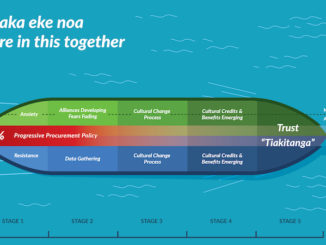
New Zealand Defence Industry CEO Jennie Vickers chatted informally at the ASIS New Zealand Chapter Women in Security event about the Defence Industry, the challenges of supplying Defence, and the potential rewards.
The New Zealand Defence Force is called in its strategy ‘the force for good for New Zealand’. I work very closely with the NZDF head of industry engagement Debbie Howarth, and she came up with this idea of describing industry as being ‘the force behind the force’.
Christopher Pyne, who was Australia’s Defence Industry Minister, adopted the phrase for Australia but we all know that Debbie came up with it first!
It’s a fantastic sector to work with, and the NZDF and Ministry of Defence people are committed to improving the participation of NZ industry. They have a very committed minister in Ron Mark and have had an impressive amount of funding over the past couple of years. It’s a great pond for industry to play in, but it can also be quite a difficult pond to play in.
Ten to fifteen years ago the industry that looked after Defence Force work were probably almost all ex-Defence, so the trust that existed between Defence and Industry was exceptionally strong on an individual-to-individual basis. What we’re seeing now is that in a world of heightened security awareness, there is a need for a massive cultural transformation around all the aspects of how to build trust when you’re not an ex-Defence person and start from scratch.
The New Zealand Defence Industry Association (NZDIA) has been around for over 20 years now. We were established specifically to find answers to the question of how to build a local industry that supports Defence without having to constantly go overseas to buy what it needs.
We were set up by the government to bring industry together with the Defence Force at the time the ANZAC frigates were being procured. I arrived in New Zealand in 1997 about the time that project was happening, blissfully unaware that it was all going on but delighted to be seeing the benefits of that policy.
It’s about 23 years later and what we now have is a government policy around procurement and delivering on the ‘broader outcomes’. It actually means we’re back at that same mindset of how do we make sure we encourage New Zealand industry to have a bigger part to play and then create jobs, support communities, and get them to be all the things they need to be?
And so that’s my job – connecting, collaborating, joining people together, arranging for Defence people to come and speak and therefore for industry to come and engage.
We work very closely with Gary [Morrison, CEO of the New Zealand Security Association] and other associations. We’ll play nicely with anybody. If we can deliver for New Zealand and make jobs, then we’re all heading in the right direction.
Doing business with Defence is exciting and financially rewarding. In the near future an announcement is to be made about the winner of the alliance project for Defence camps and bases. That will open the door to a massive amount of work right the way across the Defence Force.
Alongside that there’s a whole bunch of work going on in the security, cyber and information zone.
The Defence Capability Plan now has a section on the ‘information domain’. There’s always been air, sea and land, and now they’ve said you can’t not have information as a domain. There are a lot of opportunities here that range from everything from basic computing to security to comms on vehicles and ships, and space.
A recurring challenge, however, is getting the authorisation and the ‘right to work’ in the defence sector… it’s a never-ending circle.
If you’re on an all-of-government panel that’s great, but then the next question is “have you got a security clearance” – and there’s too few people on the panel who have the right clearance.
Enjoying this article? Consider a subscription to the print edition of Line of Defence Magazine.
It could be that there’s a whole bunch of work available for which the requirement for a security clearance seems irrelevant, in that you could do all the work outside and never need to go on base or touch a Defence computer, but somebody insists that the role requires a security clearance.
They are working on it. There’s a lot of focus in the sector around the fact that there are not enough people processing security clearances, but I think that if we all work together on this we stand a chance.
One of the things I see as my role is constantly reminding – a bit like a broken record – about the fact that government people can’t just keep giving all the work to a high profile multinational IT company because “no one ever got fired for buying from xxx….”. That approach doesn’t cut it anymore because it’s inconsistent with broader outcomes under the Procurement Rules.
The challenge that industry has in working in this sector is that there is a big prize but that it’s a tough prize to get.
When I talk to new members coming into our association, I tell them that it’s a long game, and that their best bet is to be a supplier into a prime rather than being the prime itself. Next step is to introduce them to a prime, the primes ask to be introduced to the New Zealand SMEs, but we are constantly reminded that, for those who need help being great in NZ to supply in NZ, there is no clear source of help.
MBIE is working on this challenge, they now have a small business team that’s been set up. They’ve appointed a general manager for the policy side, and we should see a team building. I’ll be chipping away on the side talking to them about things we think they should do to help New Zealand business.
Talking to my colleagues in Australia at Goal Group, their approach to how industry should go about becoming Defence ready follows a process of taking SMEs through a process where they need to become an ‘explorer’, then an ‘exponent’, and ultimately an ‘expert’. We’ll keep talking to them and look to introduce them to New Zealand agencies to help them understand how to make New Zealand businesses ‘Defence ready’ using the Australian model.
If SMEs can survive all of this then they may gain the ability to supply into Australia and be part of a budget of $200 billion over 20 years. If you can get sharpened up to sub into a prime on one of the big Defence projects, then you’ll be much better placed. Australia has more money to spend than they have manufacturing capability.
The Australians have a 15 percent quota for local work for any project worth over $15 million and the good thing is that under our free trade agreement New Zealand counts as an Australian SME. It took us a long time to get one footnote in one Australian Defence paper reminding Australian Defence and Industry that New Zealand counted under the agreement, but it was the best footnote ever.
What we are seeing now is that the companies in New Zealand that are doing really well and performing are being pushed onto the international stage as exemplars. And that is a great result.
The balance between risk and reward for industry has never been more apparent than in this sector. Everything we can do to help will pay dividends in jobs and community strength in years to come.









